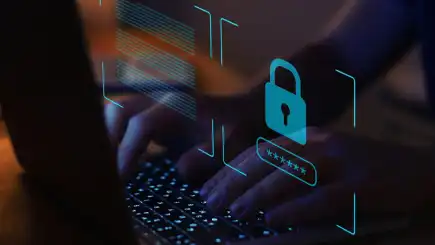Learn encryption software with online courses and programs
What is encryption software?
Cybercriminals and hackers are constantly looking for new opportunities to access and exploit private information. Around the world, digitalization has opened countless doors for cybercriminals — and today, every organization and person interacting online is at risk of a security breach that may seriously damage their finances and reputation.
By using encryption software, cybersecurity professionals and everyday technology users can stay one step ahead of the bad guys. Cryptography, the science of encrypting and decrypting information, relies on encryption software to convert unencrypted data — also called plaintext — into ciphertext. Once the data is encrypted into ciphertext, its meaning is obscured, thereby protecting it from unauthorized and potentially malicious eyes.Footnote 1
Encrypted data is read using an encryption key, which is a long, random string of numbers based on a mathematical algorithm.Footnote 2 In general, the longer the string of numbers, the stronger the encryption key. Organizations that use incredibly sophisticated encryption software with long, complicated encryption keys tend to be those that handle highly sensitive data, like governments and banks.Footnote 3
The two main types of encryption are symmetric and asymmetric. Symmetric encryption uses the same key to encrypt and decrypt information, making it a faster but less secure method than asymmetric encryption, which relies on a public key to encrypt and send data — and a separate, private key to receive and decrypt it. Symmetric encryption is used in instances where a vast amount of data needs to be secured, such as in large databases or in managing cloud storage.Footnote 4 Examples of technologies that use asymmetric encryption include digital signatures, encrypted emails, and cryptocurrencies.Footnote 5
Another method of encryption is end-to-end encryption (E2EE), which relies on the two-key method of asymmetric encryption and ensures an encrypted message cannot be read or tampered with by an intermediary service — such as an internet service provider or hacker — as it travels to its intended destination. E2EE is the encryption method used by popular messaging and communication services like WhatsApp and Zoom.Footnote 6
Encryption software is essential for securing many types of information technology. It authenticates data, keeps it confidential, and preserve its integrity in transit and at rest.Footnote 7
Browse encryption software courses
Stand out in your field
Use the knowledge and skills you have gained to drive impact at work and grow your career.Learn at your own pace
On your computer, tablet or phone, online courses make learning flexible to fit your busy life.Earn a valuable credential
Showcase your key skills and valuable knowledge.
Encryption software course curriculum
A typical encryption course can cover the fundamental cryptographic goals of authentication, confidentiality, integrity, and non-repudiation, and show learners how they can use mathematical algorithms to achieve these goals.Footnote 8
After getting a brief introduction to the history of encryption, learners may dive into the theory and practical uses of symmetric and asymmetric encryption methods, learn how encryption keys work, study encryption software vulnerabilities and security considerations, and practice applying various encryption techniques to different security scenarios.Footnote 9 An effective encryption course will also provide learners with opportunities to study the legal and regulatory issues surrounding encryption software and its applications.Footnote 10
While cybersecurity is the broader topic and cryptography a speciality within it, learners pursuing cybersecurity careers may also take encryption software courses as part of their curriculum.
edX offers a wide variety of learning options for people of all backgrounds, including boot camps as well as bachelor’s degree programs and master’s degree programs. If you’re interested in sharpening your technical skills, consider browsing diverse online course offerings to find your next step.
Jobs that use encryption software
Different careers in the cybersecurity industry use encryption software, with certain jobs not only using the software but improving it. Moreover, countless businesses and organizations from diverse industries, including finance, manufacturing, education and government, use encryption software to protect their sensitive data, with their IT departments often on the front lines of these efforts.
Jobs in cybersecurity and IT that may use encryption software include:Footnote 11
Cloud security engineer
Computer forensics analyst
Computer programmer
Computer and information research scientist
Cryptographer
Cybersecurity consultant
Cybersecurity engineer
Database administrator
Information security analyst
IT auditor
IT director
IT manager
Penetration tester
Security software developer
How to use encryption software in your career
Those working in IT departments use encryption software to safeguard their organization’s sensitive data, such as passwords, financial records, proprietary material, and human resource information. They also often develop and manage their organization’s encryption technology, testing it for vulnerabilities that hackers could potentially uncover.Footnote 12
IT professionals in industries like healthcare or retail use encryption software to help their organizations comply with government regulations and data privacy laws.Footnote 13 Cryptographers, programmers, and software developers build complex security systems using encryption software, while also finding ways to improve existing systems.
How you use encryption software in your career will depend largely on your specific job. As cryptography and cybersecurity are constantly evolving fields, it’s important that industry professionals remain curious and view learning as a continual process versus a means to an end. Lifelong learners can find opportunities to build their skills with online courses, cybersecurity boot camps and other coding boot camps, and computer science degree programs that work with their professional obligations and schedules.

